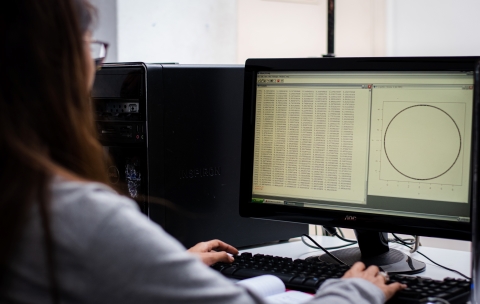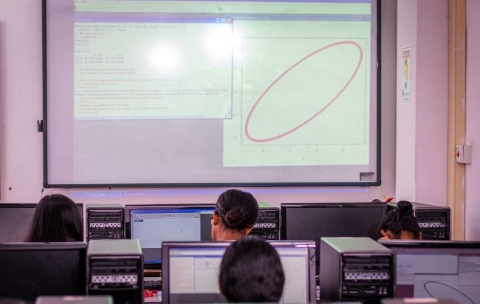Applied Mathematical Sciences (AMS)
16/08/2022 2024-04-18 13:32Applied Mathematical Sciences (AMS)
School of Innovative Technologies and Engineering (SITE)
Head of Department Message
Message of the Head of Department of Applied Mathematical Sciences

Head of Department

Email:
Departments
Applied Mathematical Sciences
The Department of Applied Mathematical Sciences holds the significant task of imparting knowledge and providing training within the fields of mathematics and statistics. These disciplines are undeniable components of the fundamentals of our modern and technology-driven society. The department delivers its competencies through a wide range of undergraduate and postgraduate programmes. The department is also responsible to cater for the numerous mathematics modules arising in the programmes offered by the other departments of the different schools of the university.
The Department of Applied Mathematical Sciences offers various undergraduate programmes in both full time and part-time modes. Our BSc (Hons) Business Statistics programme has been designed to equip students with both theoretical and practical statistical skills for the industry. Business statistics is concerned with the use of several analysis strategies and decision rules to provide industrial managers with critical views of the operational and performance characteristics of the business. The BSc (Hons) Data Science with Interactive Marketing programme offers deep-rooted mathematical/statistical and analytical/computational skills to students, in view of empowering them with the necessary competencies required for volumetric data analysis in the context of digital marketing. The BSc (Hons) Financial Engineering programme provides students with the necessary abilities to solve the ever-complicated financial instruments and financial strategies approaches, as well as bridging the gap between highly advanced theoretical financial mathematics and current practice. The BSc (Hons) FinTech (Financial Technology) programme aims to provide students with a comprehensive understanding of financial technology and its applications in the finance industry, and to equip them with the technical skills and knowledge needed to develop and implement innovative FinTech solutions. The BSc (Hons) Mathematics programme lays focus on the attributes of pure and applied mathematics. The modules in the BSc (Hons) Mathematics programme have been designed with a blend of mathematical, statistical and computer modelling to imbibe the students undertaking the programme of study with the appropriate skills to deal with the multidisciplinary involvement of mathematics. Moreover, our undergraduate students are required to undergo a work placement at the second level of the different programmes of study. It is to be noted that the BSc (Hons) Actuarial Science programme was first offered in Mauritius by the Department of Applied Mathematical Sciences and we also offered the BSc (Hons) Land Surveying (Top-Up) programme.
The MSc in Applied Statistics with Operational Research, the MSc in Computational Science and Engineering, and the MSc in Financial Engineering are currently being offered by the department. Our master’s degrees are intensive three-semester courses and are offered in part-time mode. The master’s degrees also serve as an excellent basis for students wishing to pursue studies for an MPhil/PhD degree.
On the research front, the academics within the department are involved in diverse projects in the fields of applied statistics, computational mathematics, data envelopment analysis, financial modelling, forecasting and simulation, amongst others.
Undergraduate Programmes
BSc (Hons) FinTech
Program Information The BSc (Hons) FinTech programme offers an interdisciplinary …
BSc (Hons) FinTech
BSc (Hons) Data Science with Interactive Marketing
Programme Information In this digital and increasingly automated era, much …
BSc (Hons) Data Science with Interactive Marketing
BSc (Hons) Mathematics
Programme Information The BSc (Hons) Mathematics programme lays focus on …
BSc (Hons) Mathematics
What you'll learn
BSc (Hons) Financial Engineering
Program Information Financial engineering is a multidisciplinary field, based on …
BSc (Hons) Financial Engineering
What you'll learn
BSc (Hons) Business Statistics
Businesses are being driven forward by data analytics. Business analytics …
BSc (Hons) Business Statistics
What you'll learn
Postgraduate Programmes
MSc Computational Science and Engineering
Computational Science and Engineering is a broad multidisciplinary area which …
MSc Computational Science and Engineering
What you'll learn
MSc Financial Engineering
TThe financial sector is a dynamic industry involving much uncertainty …
MSc Financial Engineering
What you'll learn
MSc Applied Statistics with Operational Research
In this data deluge era, decision making and planning processes …










